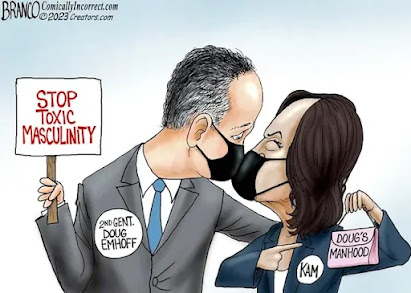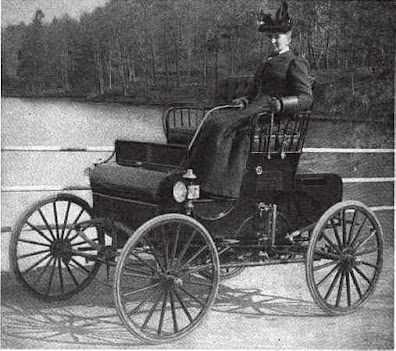The Genre Vanishes
A curious thing happened at the Olympic Games in Paris last month: the gold medal for Women's boxing was won by... a woman. And the whole internet went crazy.
I'm not sure what it says about the current state of "gender identity" when a boxer who is biologically female is no longer considered female enough to satisfy the gender-critical voices in popular culture, but the entire incident has become something of a flashpoint in the ongoing debate about the definition of gender.When I introduced this new series of films last week, I talked about the A-Level essay I was asked to write (a long time ago) discussing whether or not the Eroica Symphony could be defined as "Romantic".
Before one can answer such a question, one first needs to agree on a definition of "Romantic Music". Likewise, deciding whether or not the boxer Imane Khelif is female depends entirely on how one defines the term female.
Khelif certainly appears to meet the medical definition of female: she has a uterus and a menstrual cycle (so I understand; I haven't personally checked) but the loud voices that have been questioning her eligibility appear to be focussing on the fact that she doesn't look female; or at least she doesn't look the way they think a female should look.
Is this how "female" is supposed to present?
The reverse is also true, by the way: certain critical voices have recently let it be known that a few high-profile men of the moment do not meet their current standards for male...
Is Doug Emhoff somehow not "male" because he's married to a Vice President?
The arguments we are currently seeing about words like gender (or fascism or genocide) are the same arguments that scholars often have whenever they try to agree on the definition of words like thriller, or western, or rom-com.
Consider Hitchcock.
Alfred Hitchcock is probably one of the most recognisable directors in the history of cinema. He was famous at a time before film directors were widely considered the "authors" of their films, and his name was often the biggest selling-point of the films he made.
Film-goers who were only vaguely aware of (for example) Billy Wilder or Howard Hawks or Joseph Mankowitz would immediately know what kind of film to expect from Hitchcock, and they would even recognise him on sight (thanks partly to Hitchcock's fondness for popping up at random moments in his own films). Even today, Alfred Hitchcock is one of the very few film directors to have become an action figure.
Not even Spielberg got that particular honour.
Hitchcock's films are famous for their tension and their suspense. He taught a whole generation of movie-goers to be terrified of birds and showers, and the women of his films have become the stuff of cinema legend.
Let's talk about Hitchcock's women for a moment.
The archetypal Hitchcock female character is the unapproachable, icy blonde who is invariably an object of desire, for the male protagonist and for the audience. She is also generally a passive character in the sense that she is the receiver of action in the story.
Things happen to her: she is menaced, she is threatened, she is murdered, she is (occasionally) rescued.
This is partly what makes our upcoming film so unusual.
The Lady Vanishes was released in 1938 and takes place in the (fictional) mittel-European country of Bandrika, where an odd assortment of (mostly unconnected) British travellers are heading home by train.
A young woman named Iris Henderson strikes up a casual friendship with a middle-aged governess named Miss Froy, and is then perplexed when Miss Froy apparently vanishes from the train.
The Lady Vanishes is a spy thriller that was released when Europe was on the brink of war. England was about to get dragged into an apocalyptic conflict that was going to fundamentally alter the power dynamics of the Western World, and Hitchcock's film makes no attempt to shy away from any of that.
But it is also a very unusual Hitchcock film.
First of all, it's funny. Hitchcock was many things, but he was not generally known for his comedy, and his (very few) out-and-out comedies tended to fall very flat. The Lady Vanishes is a spy thriller with murder, intrigue and plot twists, but it is also a very sharply observed comedy of manners with a rich and surprisingly subtle humour.
In fact, the film is more comedy than thriller. Nothing remotely sinister happens for the first third of the story, and even then, the menace takes its time to become apparent.
Also, this is one of the only Hitchcock films to feature a female protagonist. Remember all those classic Hitchcock ingénues? Margaret Lockwood's Iris is not a passive character and she is not a sex object: she drives the narrative and assumes an active role in moving the story forward.
And then there are the supporting characters of Charters and Caldicott, perhaps the most memorable cinematic gay couple of the 1930s.
Naunton Wayne and Basil Radford were so popular in these roles that they made appearances together in a total of ten films (often playing the same characters) along with a number of radio appearances. They are comic characters, to be sure, but there is nothing remotely nasty or prurient in their portrayal (and no doubt whatsoever that they are meant to be a couple).
The Lady Vanishes is undeniably a Hitchcock film, with drama, tension and intrigue. But it's also a screwball comedy. And a farce. And a wartime propaganda story. With a strong, non-sexualised female lead.
This is a film that is "genre fluid" in the truest sense, and one could write a PhD thesis attempting to "label" it.
Or, you could forget about the labels and just watch the film, as we will be doing at 7.30pm on Thursday, the 12th of September at the Victoria Park Baptist Church.
Some films don't need to be labelled. This is The Lady Vanishes. That's what it is.






















This is a fascinating analysis of definitions, labels, stereotypes, and of the film itself. I'm a regular reader of the other platform in which you comment every day. You likely don't remember me, but I go by CrowProf. I've long been interested in your films series (the plural). Although I can't benefit from your lectures, I'm happy I can read your analyses here and try to see the films you're showing. When I win the lottery, I'll hop a plane from Seattle and sit in the front row. Thank you for sharing your knowledge and making the world a little better place.
ReplyDeleteThank you so much for your feedback; you've made my morning! I know Seattle is a long way from East London, but needless to say you well be very welcome should you ever find yourself in this part of the world. I'll keep a seat reserved for you!
Delete